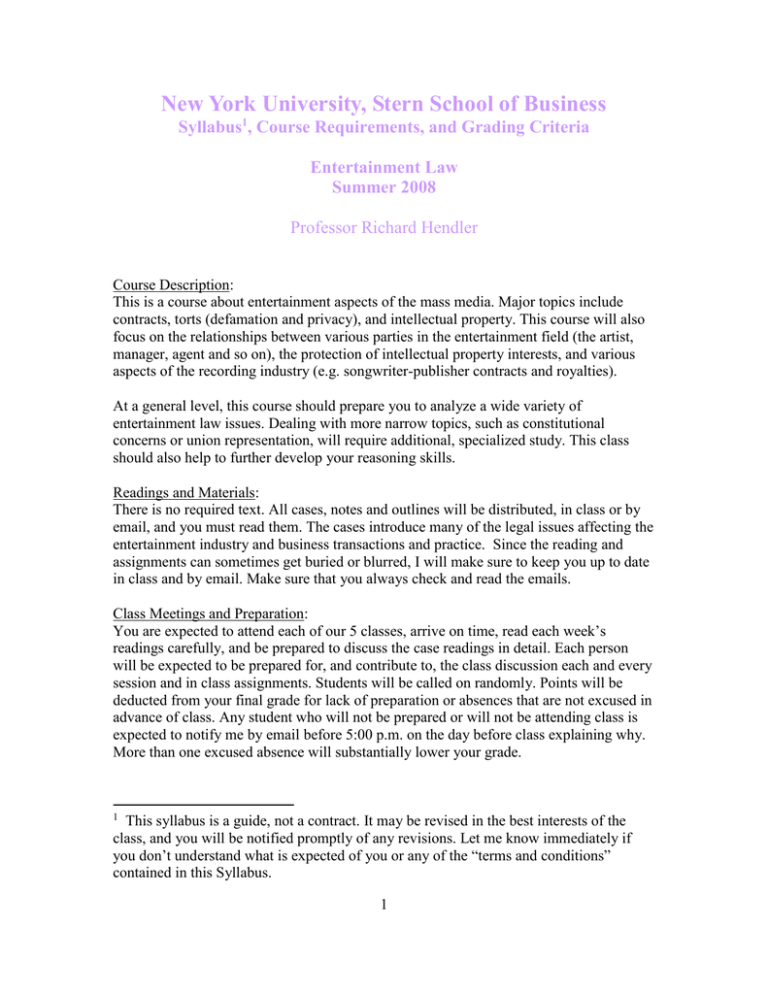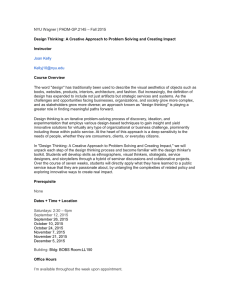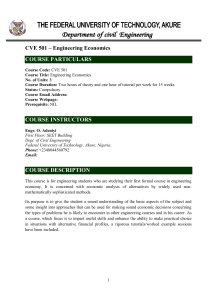New York University, Stern School of Business Syllabus
advertisement

New York University, Stern School of Business Syllabus1, Course Requirements, and Grading Criteria Entertainment Law Summer 2008 Professor Richard Hendler Course Description: This is a course about entertainment aspects of the mass media. Major topics include contracts, torts (defamation and privacy), and intellectual property. This course will also focus on the relationships between various parties in the entertainment field (the artist, manager, agent and so on), the protection of intellectual property interests, and various aspects of the recording industry (e.g. songwriter-publisher contracts and royalties). At a general level, this course should prepare you to analyze a wide variety of entertainment law issues. Dealing with more narrow topics, such as constitutional concerns or union representation, will require additional, specialized study. This class should also help to further develop your reasoning skills. Readings and Materials: There is no required text. All cases, notes and outlines will be distributed, in class or by email, and you must read them. The cases introduce many of the legal issues affecting the entertainment industry and business transactions and practice. Since the reading and assignments can sometimes get buried or blurred, I will make sure to keep you up to date in class and by email. Make sure that you always check and read the emails. Class Meetings and Preparation: You are expected to attend each of our 5 classes, arrive on time, read each week’s readings carefully, and be prepared to discuss the case readings in detail. Each person will be expected to be prepared for, and contribute to, the class discussion each and every session and in class assignments. Students will be called on randomly. Points will be deducted from your final grade for lack of preparation or absences that are not excused in advance of class. Any student who will not be prepared or will not be attending class is expected to notify me by email before 5:00 p.m. on the day before class explaining why. More than one excused absence will substantially lower your grade. 1 This syllabus is a guide, not a contract. It may be revised in the best interests of the class, and you will be notified promptly of any revisions. Let me know immediately if you don’t understand what is expected of you or any of the “terms and conditions” contained in this Syllabus. 1 Office Hours/Availability: I will be available after class and by appointment. In addition, you can reach me at 212.998.0057 (NYU), 516.984.6900 (cell,) or via email at rhendler@stern.nyu.edu. My office is located at 44 West 4th Street, 10th Floor, Room 10-77 (in the Accounting Dep’t). Course Project, Mini Research Paper, and Examination: Each student will be required to complete and submit two projects and a final examination. First project: Locate a deal memo in your field of interest. Review and analyze it. For example, is it an offer? What provisions trouble you the most? Would you agree to it and why? Pick a field of interest (for example, film) and then a sub interest (for example, product placement in films). After deciding on a topic, prepare a memo/outline involving most material points and under each point, describe the range of interests of both sides to the contract (for example, agency compensation from 10-15%). Due Date: September 4. Second Project: Research Paper: You must conduct original research about contemporary issues centered in any area of concern to the entertainment industry. Obviously, the issues should also interest you. The paper should be approximately 10 pages in length and in a conventional writing format, or if you prefer, in another format that I approve in advance. Topics must be chosen and cleared by the third week of class. Papers will be due at the end of the final class period, with copies to each of your classmates. You may work singly or in collaboration with others on your projects, but in the latter case the scope, depth or other dimensions of the project must be increased accordingly. Due Date: September 18 Examination: One open-book, on-line final examination will be given covering entertainment law as illuminated by the assigned readings as well as class lectures, discussions, and assignments, projects, and video exercises. Open-book means only the materials distributed in connection with this course, your class notes, and any other materials created substantially on your own (including any outline prepared by a group of which you were a participating member). The exam will be a combination of short essays, fill-ins, and/or multiple-choice questions. The exam may be taken individually or in groups of up to four and will be administered during the week of September 14 to 21. Again, the exam will be on-line. 2 Groups: You may form groups of at most four students for doing the project, research paper, examination, and other group work during class. Grading Criteria and Weighting: Grading will be based on the following factors: participation and in class assignments (25%), merit of the projects (40%), and examination (35%). Points will be deducted from your final grade for absences that are not excused in advance of class. I grade the exam, projects, and papers "blind." So put only your NYU number, not your name, on any submission. All submissions must be deposited in the box in front of my office door. I do not curve grades in this class; the chips fall where they may: in theory there could be all A's, or none, although reality tends to fall between these extremes. A substantial part of the examination will be based upon the discussions raised in class and cases. Policy on Academic Dishonesty: Academic dishonesty could consist of copying another’s work and submitting it as one's own, failing to attribute credit to a reference source, or copying from another during an exam. Academic dishonesty undermines the school's student code of conduct and is unfair to other students. Instances of academic dishonesty will be referred to the Stern School Discipline Committee. Schedule of Classes, Topics, Assignments, and Projects: The schedule set forth below is subject to change as the need arises and it probably will change. All changes will be announced in class or by email. If you miss a lecture, it is your responsibility to learn of any announced changes and the material from your classmates. Readings should be completed in advance of the class session for which they are indicated. I also recommend that you review those readings again after class for reinforcement. Class 1: Overview (getting familiar with one another and some housekeeping). The Playing Field: The State and Federal Court Systems. Pepsi Assignment. Class 2: Contract Law Sources and Principles: Contract = Offer + Acceptance + Consideration + (no defenses); Breach; Measuring Damages; Specific Performance; Promissory Estoppel. Project #1 is due. Class 3: Intellectual Property principles: Trademarks: Ownership; Infringement; Parody, and Fair Use. Copyright: Authorship; Copyrightable; Infringement; Fair and Unfair Use; and Works for Hire. Barbie and Evil Knieval In Class Assignments. Class 4: Contract provisions in Sports, Music & Film. Actual contracts will be distributed and analyzed. 3 Agency Relationship: Formation; Authority; Fiduciary; Liabilities; Regulation. Entourage In Class Assignment. Intellectual Property principles: Copyright: Copyrightable; Authorship; Infringement; Fair and Unfair Use; Works for Hire; and Effects of Technology. Music Plagiarism In Class Assignment. Class 5: Torts & Celebrity Rights: Impersonator and dot.com In Class Assignments. Defamation; Infliction of Emotional Distress; Tortious Interference with Contractual Relations; Privacy; Public Disclosure; False Light; and Publicity Rights. Remember to search and find passion in your life!! 4


